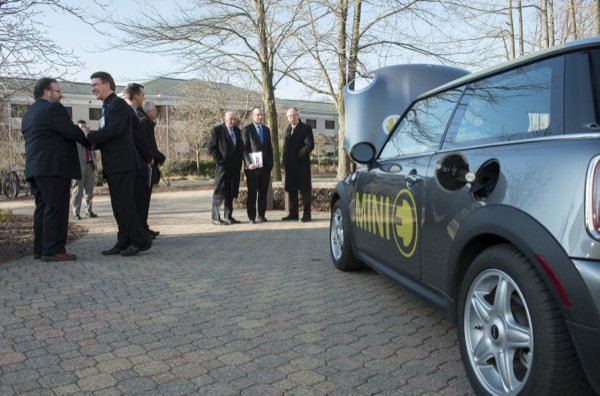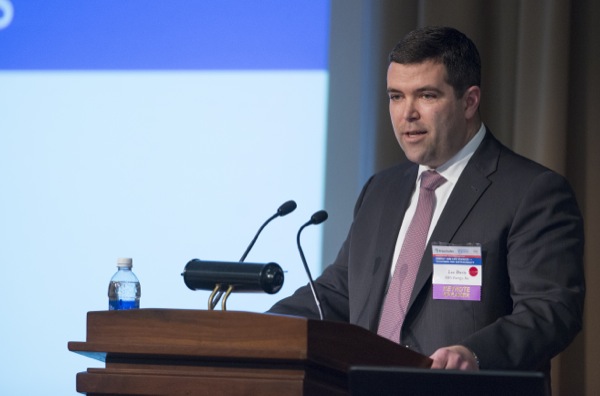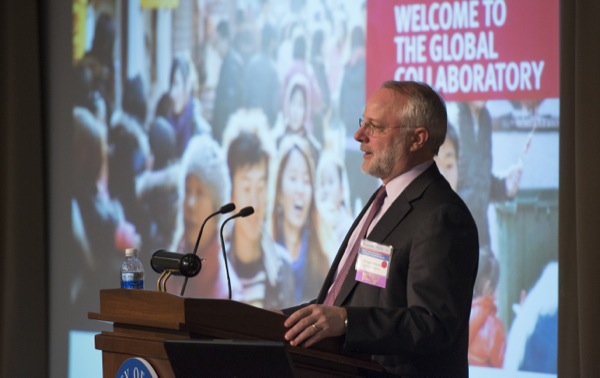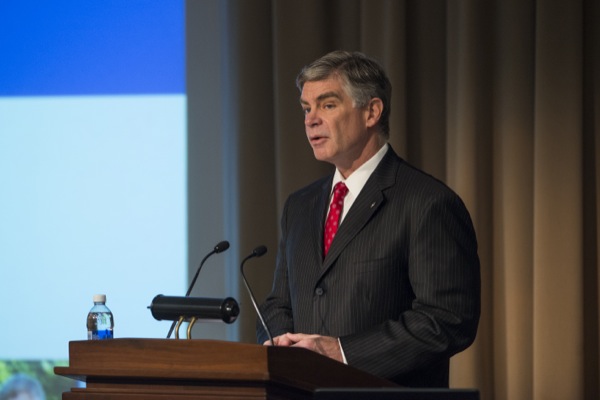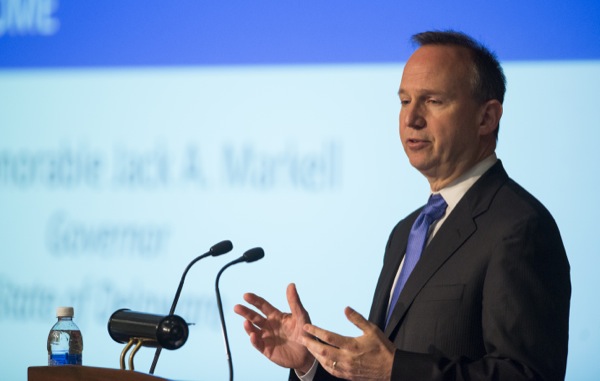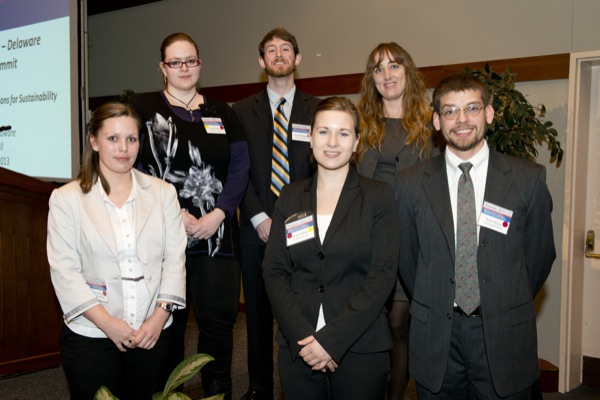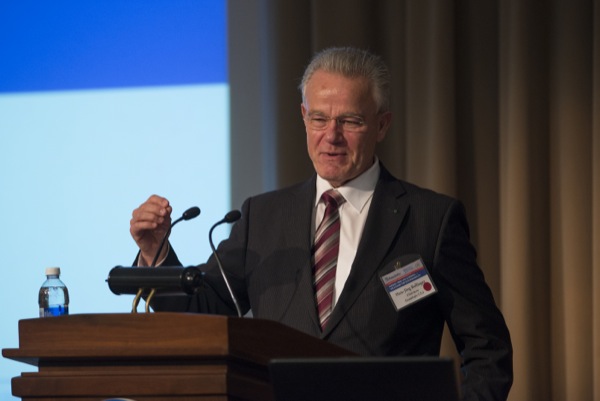Inaugural tech summit
Fraunhofer–Delaware Technology Summit addresses solutions for sustainability
1:16 p.m., March 6, 2013--Portable pergolas with solar panel roofs. Drought-tolerant corn. High-oleic soybeans that eliminate the need for health-harming hydrogenation. Cars that feed electricity back to the grid. Cellulosic ethanol as a non-food source of liquid fuel.
Solving global problems in energy and the life sciences will require innovations like these and others not yet conceived in order to feed a growing world population, keep that population healthy, and meet its mounting energy requirements in sustainable ways.
Campus Stories
From graduates, faculty
Doctoral hooding
For additional images of the summit, see UD in Photos.
On Tuesday, March 5, academic scientists and engineers came together with CEOs and entrepreneurs at the inaugural Fraunhofer–Delaware Technology Summit to discuss energy and life sciences challenges in a rapidly changing global environment. The event was held at the University of Delaware’s Clayton Hall Conference Center.
Delaware Gov. Jack Markell said that partnerships like the one between Fraunhofer and UD are more important than ever.
“We have to learn from the world,” he said. “Countries like Korea and India are experiencing incredible development as a result of innovation and investment.”
In welcoming the 180 summit participants, UD President Patrick Harker pointed to the gray and green Mini Cooper parked outside the building.
“It’s one of a fleet of electric Minis that we have charging up across campus, nearly ready to be licensed for road use,” he said. “The innovative cars can store energy in their battery systems, and then give and take power on command from the grid. I hope you’ll take a few minutes during this morning’s break to look at the car up close and start imagining what it could mean for America’s energy future.”
The Fraunhofer organization takes its name from 19th-century researcher, inventor, and entrepreneur Joseph von Fraunhofer. According to Fraunhofer USA Chairman Hans-Jörg Bullinger, Fraunhofer had a research facility on one side of the street and a factory on the other so that his research could be applied immediately.
“Just as it takes money to generate knowledge,” he said, “it takes knowledge to generate money. We have to connect what we learn from fundamental research to what is needed in industry.”
Keynote presentations
Originally scheduled for Oct. 29, 2012, the summit was postponed when Superstorm Sandy wreaked havoc on the region that day. The storm served as a sharp reminder of the need for strategies to supply customers with power when the grid is down for days and even weeks.
Lee Davis, senior vice president of NRG, one of UD’s partners on the electric vehicle project, addressed this issue in his keynote presentation, “From Fossil to Photons: An Energy Company’s Transformation.”
“Even though we had a number of sunny days after Sandy,” he said, “we had no way to deliver solar power directly to homes. Reliability is an issue that we have to address.”
NRG businesses span a wide range of technologies, from coal, oil and natural gas to nuclear and solar. “Our goal is to modernize fossil technologies and expand renewables,” said Davis, who also is president of NRG’s eastern region.
The company’s innovations include leased rooftop solar panel installations, a network of home and public charging stations for electric vehicles, and a customer rewards program for money spent on electricity through a network of partners and associations.
Douglas Muzyka, senior vice president and chief science and technology officer at DuPont, delivered the other keynote talk, “Life Sciences Addressing Global Challenges.”
Muzyka discussed the National Academies’ 2009 “New Biology” initiative, which promotes greater integration within biology and closer collaboration with physical, computational and earth scientists, mathematicians and engineers in order to find solutions to four key societal needs: sustainable food production, ecosystem restoration, optimized biofuel production, and improvement in human health.
“Integrated science is our approach to addressing global challenges in these areas,” Muzyka said. “Integrated science can unlock the potential of advanced biofuels and improve efficiency.”
He also pointed to breeding and biotechnology as paths to increasing crop yield and improving the nutritional quality of food.
“Twenty-first century innovation will depend on partnerships with global corporations, national labs, universities and entrepreneurs,” Muzyka said.
Student exchange program
A new Fraunhofer-UD graduate student exchange program was announced and highlighted during lunch. Six graduate students have been selected to participate during summer 2013: German students Carolin Hartwig, Elisabeth Bludau and Maria Stössel will work with UD faculty, and UD students Peter Worthington, Robert Kaspar and Erin Crowgey will spend the summer in Germany working with Fraunhofer researchers.
Concurrent sessions
Concurrent sessions in the afternoon were built around additional plenary talks and panel discussions.
The following talks were offered in Session A, “Life Sciences Solutions”:
- “Step Ahead Together: Creative Collaborating as an Approach to Building and Sustaining a Pharma R&D Pipeline,” John Cantello, GlaxoSmithKline.
- “Opportunities and Challenges in the Development, Manufacturing and Downstream Processing of Modern Biopharmaceuticals,” Jürgen Drossard, Fraunhofer IME.
- “From Bedside to Bench: TGN1412,” Zoe Waibler, Paul Ehrlich Institute.
Life sciences panel discussions were moderated by Robin Morgan, UD Department of Animal and Food Sciences; Vidadi Yusibov, Fraunhofer CMB; and Uwe Heinrich, Fraunhofer ITEM.
Session B, “Sustainable Energy Concepts,” included the following presentations:
- “Challenges and Solutions for a Renewable Energy Economy,” Christopher Hebling, Fraunhofer ISE.
- “Clean Energy: Flash without Flame,” Yushan Yan, UD Department of Chemical and Biomolecular Engineering.
- “Infrastructure-Ready Biomass-Derived Oils: Incentives, Options and Process Models,” Michael Klein, University of Delaware Energy Institute.
Energy panel discussions were moderated by David Weir, UD Office of Economic Innovation and Partnerships; Bob Birkmire, UD Institute of Energy Conversion; and Görge Deerberg, Fraunhofer UMSICHT.
A poster session and reception rounded out the first day of the event, with lab tours and follow-up discussions scheduled for Wednesday, March 6.
The summit was organized and chaired by Karl Steiner, senior associate provost for research development at UD, and Vidadi Yusibov, executive director of the Fraunhofer Center for Molecular Biotechnology.
Fraunhofer-UD partnership timeline
- 1996: Fraunhofer Resource Center–Delaware is established based on a collaboration between the University’s Center for Composite Materials and the Fraunhofer Institute for Advanced Materials.
- 2001: Fraunhofer establishes a second center in Delaware, this one linking the Fraunhofer Institute for Molecular Biotechnology and Applied Ecology with the Delaware Biotechnology Institute.
- 2003: Fraunhofer USA builds its first laboratory outside Germany, at the Delaware Technology Park in Newark.
- 2011: Fraunhofer, the state of Delaware, and UD sign a comprehensive, six-year Master Partnership Agreement building on the complementary strengths of the institutions.
- 2013: Fraunhofer and UD hold their first joint technology summit and launch a graduate student exchange program.
Article by Diane Kukich
Photos by Kathy F. Atkinson and Lane McLaughlin






